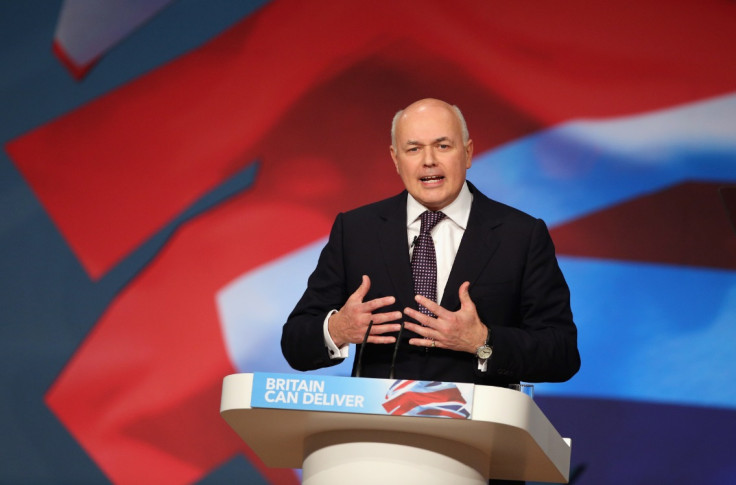EU referendum: Iain Duncan Smith and Stephen Kinnock clash in Brexit debate
Top Conservative MP Iain Duncan Smith and rising Labour star Stephen Kinnock clashed in a fiery economic debate over the EU referendum, with just weeks to go before the 23 June ballot. The politicians were joined by former British Chamber of Commerce (BCC) chief John Longworth and Paul Drechsler, the pro-EU president of the Confederation of British Industry (CBI).
The grand headquarters of the Institute of Directors (IoD) provided a neutral venue for the event, which was hosted by bookmakers Ladbrokes. Although business was the topic for discussion, Duncan Smith set his sovereignty argument out early.
"It is not even an issue solely about economics," the former cabinet minister stressed. "Fundamentally at the bottom of all of this lies a very simply principle.
"It is do you believe that a democratic nation state, electing its government, ultimately governing in a sense of what is best for that nation, that they are likely to be more flexible, more credible and more responsive to those that govern for than a nation caught in a web of 28 nations all with different priorities, but overridden by an unelected bureaucracy."
But the debate soon turned back to the economy, with Drechsler arguing the UK's membership of the EU encouraged Foreign Direct Investment (FDI) into the country and access to top employees from the continent. In contrast, Longworth claimed the Labour Party should be ashamed of itself over the issue of immigration.
"The EU has been a disaster for working people in the UK," he claimed "Migration has led to a low wage, low skill, low productivity economy, partly because the cheap supply of labour for corporates has meant that they have not had bothered to invest in productivity improvement and skills training."
The exchange came hours after the Institute for Fiscal Studies (IFS), an independent think-tank, warns the UK would have to face another two years of austerity measures in the event of a Brexit. The report was the latest piece of economic research to warn against a 'leave' vote, following the Treasury, Bank of England and the International Monetary Fund (IMF).
"Almost all of these forecasts at the end of the day, as the OBR said, are probably wrong. If you go back to those forecasts before the 2008 crash, everyone was wrong," Duncan Smith argued.
"I like to look at where we are now and ask myself where the balance of risks is in all of this. The balance of risk is very simply: the balance of risk of staying in is that you lock yourself to a European Union, a model of market design, that is past its sell-by-date and doesn't work any longer – it's bureaucratic, it's top heavy and it's overregulated.
"The euro itself is in a state of crisis. Even though we are not in the euro, what is driving so many young people to come from places like Italy and Spain, not just places in Eastern Europe, is the crisis that they have got of not being able to find jobs."
But Kinnock, the son of former Labour leader Lord Neil Kinnock, argued that UK voters should take heed of the recent economic reports. "When you've got the likes of the IMF, the Bank of England, the Treasury, just about every single valid opinion out there, lining up and saying absolutely clear that there would be an immense short-term shock at least to the British economy, it's clear that a leave vote would be a huge leap into the unknown," Aberavon MP said.
"You are unravelling a 43-year-old relationship. Whether or not the UK is inside the EU, when Europe sneezes the UK catches a cold. We know that we are always affected by what's going on just on the other side of the [English] Channel."

© Copyright IBTimes 2024. All rights reserved.






